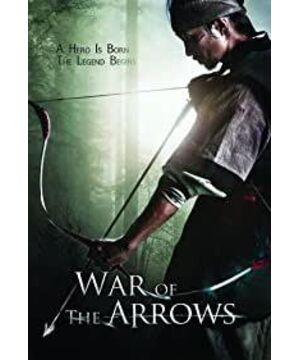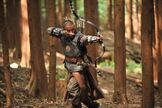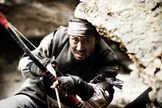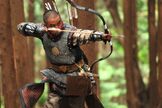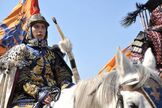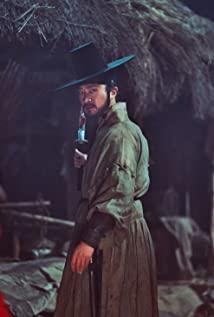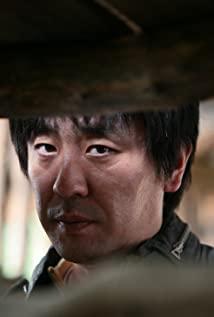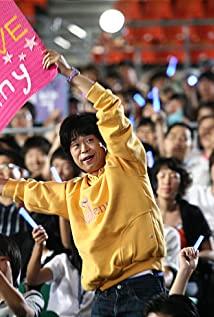As China's neighbors, North Korea and China have been in constant conflict for generations. In 1388, the Goryeo Dynasty even wanted to invade Northeast China, so the later Li Dynasty came into being. Therefore, it is impossible to look at the issue of aggression from the perspective of North Korea. After all, it has invaded itself, so it is narrow to view this film only from the perspective of aggression.
The whole film does not cut in from the perspective of the Li Dynasty, but describes a lone hero. In the film, the most striking thing is the superb bow of "Push Mount Taishan forward, hair like a tiger's tail", and the moment when the blood of the hero Cui Nanyi flows through these eight characters. The purpose of the whole film is also revealed - to praise the great fighting spirit of mankind in the face of helpless fate.
Park Hae-il's performance is enough to give such a vivid image of the struggle, but the uncle of the prince, played by Ryu Seung-ryong, is even more eye-catching. The eyes and movements of Prince Shujue Xinta perfectly present the fierce and sturdy Qing cavalry over time, and the iron will of the Qing Empire is self-evident.
But the question is, who is Jue Xinta?
In 1636, when Bingzi was in chaos, the ruler of the Qing Dynasty was Aisin Gioro Huang Taiji, and it was Huang Taiji who launched a war of aggression against Korea. The father of Huang Taiji, Aisin Gioro Nurhaci had sixteen sons, none of whom died in 1636-1637.
One more question, who is the prince?
Huang Taiji died suddenly in 1643, and he had not yet established a prince. Dorgon supported Aisin Gioro Fulin as the emperor, that is, Shunzhi. Even if the fact that "the prince has not been established" is false, before Fulin, there was only one son of Huang Taiji who could meet the age requirements and was alive in 1636 - Aisin Gioro Hauge, and Hauge died in 1648.
In this regard, I have to say that "Bow" gave up the historical facts, and in order to promote the ability of a lone hero, Park Hae-il unknowingly turned on the God mode in a meticulous style.
There happens to be a canyon, it can't be too far, and it can't be crossed; it can't be too close, and there can be no subsequent climbing and death. The cavalry archers, who have been hunting for years, also made a low-level mistake. Without waiting for the friendly troops to safely climb the cliff, they gave up their cover and leaped the distance with their lives.
There must be a tiger, otherwise Cui Nanyi will be trapped to death when he finally returns. The tiger is also very strange, the position that appears is not the place where it originally haunted, but just behind the cavalry archer. Of course, there have been tiger traps before, but no one knows why the tiger traps appeared hundreds of miles away from home and across the Yalu River.
The neat Jue Xin Pagoda also seemed to have been affected by the death of the "Prince", so he had to catch a living one, so the arrows of the cavalry archers could not hit the key points, causing Cui Nanyi to escape again and again. Even in the end, the cavalry archers died one by one, and the iron man Juexin Tower did not slow down until he was the only one left.
All of this requires not only Cui Nanyi to have sharp shooting skills, but also to have a good body. Even if the arrow in his left arm is seriously injured, it cannot affect his stable holding of the bow under the strong pulling force, otherwise he will lose his accurate head. Jue Xinta, who is also a sharpshooter, has the same luck. In order to achieve a perfect ending, "Bow" finally gave up the cautious attitude he had always held, allowing him to visually observe a distance of 300 meters on the top of the mountain. To deliver a precise killing blow, the force must also exceed the range of the traditional bow, reaching the level of the British longbow.
But Korean film and television seems to have a bit of love no matter the genre. Thirteen years after defecting to Jin Wushan, her sister Cui Ciren seems to have forgotten that she and her brother Cui Nanyi's father are the same person, and even said "Why don't you understand my sister?" Heart", one can't help but wonder if the clip of "one of these two is adopted by Choi Ping-liang" has been missed. It's better.
Note:
I watched this movie a few years ago and gave it a 6. Among the films I reviewed, 6 points is relatively low, and I saw some related praises recently. I can't help but wonder if I felt too naive about the film a few years ago. After all, most of the scenes about the bow battle in the film are very exciting.
So what if I'm wrong and someone else is right?
With this attitude, I re-watched the film, and gradually got back the idea of the year, and affirmed the score of 6 points again. Maybe this score is slightly biased and there are too many personal inclinations, but at least the attitude is prudent and serious, everyone forgive me.
View more about War of the Arrows reviews


